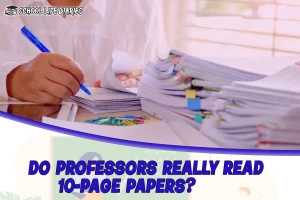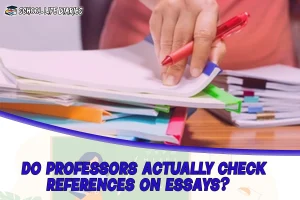Yes, professors often read research papers to gain an understanding of the latest findings in their field of study. However, they may not be able to provide a detailed critique of every paper they read. They may focus on identifying key takeaways and implications for their own work. Professors are typically inundated with papers to read, so they may not be able to dedicate as much time to each one as the authors of those papers would ideally like.
Can Professors Really Read Your Research Papers and See Your GPA?
Yes, professors can see your GPA and read your research papers. GPA and research papers are important, but they’re not the only things that matter to professors. They’re also looking for evidence of your ability to engage with course material, express yourself clearly, and think critically. In order to make a good impression on your professors, you need to be able to show them that you’re engaged with the material. This means asking questions in class, participating in discussions, and demonstrating that you’re truly interested in the subject matter.
Do Professors Check Every Source?
No, professors typically have a lot of sources to check, so they may not be able to verify every single one. However, they will typically check the most important or credible sources, so it is important that your sources are among those. If they notice something incorrect, they will dig deep into the source and counter-check all other sources. But since most lecturers are entirely familiar with their line and specification of teaching, they can tell when a student gives an incorrect reference.
Do Professors Fact-Check the References in the Assignments?
Yes, professors often fact-check students’ references in their assignments. This is to ensure that the information provided is accurate and supports the student’s argument. If a student includes a reference in their assignment but it is found to be inaccurate, the professor may penalize the student accordingly. Fact-checking is an important part of the academic process, and students should be aware of this before they submit their work. By double-checking their references and using only reliable sources, they can avoid any penalties from their professors.
Do Professors Actually Check References On Essays?
Some professors check references on essays, while others do not. It really depends on the professor’s policy and what they are looking for in the essay. Typically, if a professor is going to check references, they will do so near the end of the grading process. This means that if you have not properly cited your sources, they may not be caught until after you have received your grade. If you are worried about getting caught for plagiarism, the best thing to do is to make sure that you cite all of your sources properly. This includes both in-text citations and a list of references at the end of your essay.
Do Teachers Actually Look At the Citations in the Works Cited?
Some teachers definitely do look at the citations in the works cited, while others may not. However, it is generally considered good practice to include accurate and complete citations in your work, so it is likely that at least some teachers will take note of them.
Do Professors Really Read 10-Page Papers?

Do Teachers Check to See if a Source is Accurate on a Student’s Paper?
Yes, teachers check to see if a source is accurate on a student’s paper. This is done by verifying the source information, such as the author, title, and publication information. Teachers may also check to see if the information in the paper matches the information in the source. If it does not match, the teacher may question the student about why they included the information. However, teachers generally do not check to see if a source is appropriate for a student’s paper. This is because there are so many different types of papers and sources that it would be impossible to check them all.
Do the Professors Really Read the 10,000-Word Theses of 10 Graduating Bachelor’s Students?
No, it is possible that the professors only skim the theses to get a general understanding of them and do not read every word. As a result, it is important to make sure that the beginning and end of each chapter are particularly well-written and attention-grabbing. It is also worth noting that, in general, professors are more likely to remember theses that they enjoyed reading.
Do English Teachers Actually Read Essays?
Some English teachers do read essays, while other English teachers may only grade grammar, usage, and mechanics. It really depends on the school and/or instructor. If your instructor does read essays, they will be looking for a well-written, thoughtful, and engaging essay. The purpose of the essay is to allow the student to express their thoughts and ideas on a given topic. The instructor will be looking for evidence of critical thinking, as well as proper grammar, usage, and mechanics.
Do Professors Hate Grading Papers?
Yes, many professors do not enjoy grading papers. It can be tedious and time-consuming to go through all of the submissions and provide feedback. Grading can be subjective, and there is always the potential for disagreement among professors about the quality of a particular submission. However, grading papers is an important part of a professor’s job, and it is necessary in order to provide students with feedback about their work. Grading can also be used as a way to evaluate a professor’s teaching ability. In sum, while grading may not be everyone’s favorite task, it is an important part of a professor’s job.






